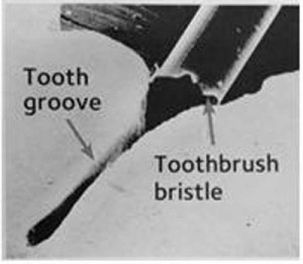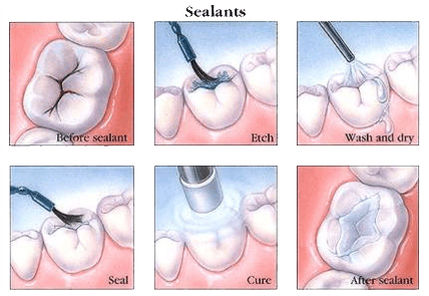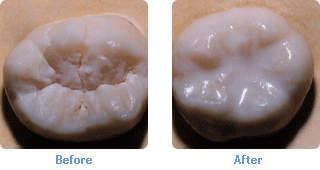What is a dental sealant?
A sealant is a tooth-colored resin material that is placed on chewing surfaces of teeth to help them stay cavity-free.

Why do teeth need sealants?
Molar and premolar teeth often have very deep pits and fissures. While bacteria can easily enters these groves, toothbrush bristles are often too large and therefore ineffective. As a result, these areas become the perfect breeding ground for bacteria to multiply which can lead to dental decay. A sealant does just what its name suggests…it seals off the grooves so that bacteria can’t enter. After a sealant is placed these areas can no longer harbor bacteria and your tooth brushing once again becomes effective.

What teeth need sealants?
Any teeth that have deep groves or pits can benefit from sealants. These are most often found on molar and premolar (teeth right in front of the molars) permanent teeth, but varies from one individual to another. One person might benefit from sealants on all molars and premolars (16 teeth), while another may only need their molars (8 teeth) sealed.
Once a tooth has a dental filling in it, it no longer benefits from a sealant.
People often think that only children benefit from sealants. That is because sealants are typically placed on a child’s molars when they first erupt. The reality is that any teeth with deep pits and fissures (that do not already have fillings) can benefit from sealants because they will help prevent future cavities.

How is a sealant applied?
No tooth structure is removed in order to place a sealant. Instead it is kind of like painting your fingernails: resin material is only added, nothing is taken away. The tooth is thoroughly cleaned with a pumice and etch. The tooth is then washed thoroughly. Finally, the sealant material is applied and then cured with a light in order to harden it.
 How long do sealants lasts?
How long do sealants lasts?
Sealants typically last two to five years. Although, it is not uncommon to see sealants in adults that were placed in childhood and are still intact.
Avoiding sticky, chewy, and hard foods can potentially prolong the life of a sealant.
If a sealant is no longer fully intact then it is no longer effective and should be replaced by your dentist. If it has been less than two years since the sealant was placed, ask if your Apex family dentist offers a warranty for sealants.

